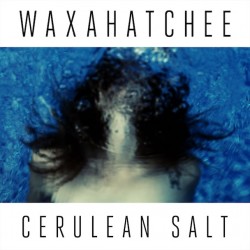On American Weekend, Katie Crutchfield’s 2012 debut as Waxahatchee, threadbare acoustic guitars formed the backdrop to songs that frankly explored the doomed relationships lining its maker’s rocky transition into adulthood. "I’m aware that I am falling flat, and you will hurt me," she sang on ‘I Think I Love You’. "And I deserve it."
As Crutchfield has explained in interviews, sad songs are a natural fit for her; attempting to convey other emotions simply doesn’t ring true. Cerulean Salt amps up the instrumentation from its predecessor, but while that album’s songs groped toward an uncertain future, its follow-up dwells on an easier, less complicated past. Sadness is still very much at the core of what Crutchfield does as Waxahatchee, but buoyed by direct arrangements and simple, repetitious chord patterns, it is is the kind of sadness that you can get your teeth into; something honest and oddly invigorating rather than self-pitying or mundane.
A typical opening line, from ‘Brother Bryan’: "I said to you on the night that we met, ‘I am not well.’" Deftly, and with minimal fuss, she sets up her listeners for short, punchy songs that make no apologies for their downbeat tone. A sharp eye for detail is evidenced throughout: a disintegrating relationship is set against a house full of "slurred speech" and stars that "could be tawdry streetlight" on ‘Lips and Limbs’; elsewhere eyes "flood like rivers or wine."
Though made up of darkened bedrooms, dread atmosphere and "civic hell", …Salt is by no means a slog, nor a particularly oppressive listen. Crutchfield’s delivery is a major strength; these vignettes are relayed by a raw, wounded and versatile voice shaped by formative years spent touring the States in a host of punk bands (notably in P.S. Eliot with twin sister Allison, now of Swearin’): whether whispering (‘You’re Damaged’) or shouting (‘Misery Over Dispute’), the effect is equally powerful. Given the depth of sincerity on display, even her put-downs don’t so much sting as suggest that the blame for the predicaments these songs were born out of is a shared one.
Falling at either end of its spectrum, ‘Coast To Coast’ is a bracing two minutes of summery indie rock that leavens deep insecurity with a sense of unity, while closer ‘You’re Damaged’ evokes the loss of childhood innocence with just a few rhymes, an acoustic guitar and an arresting vocal performance. "No, I cannot breathe underwater," she sings on the latter, one of the many references to immersion sprinkled throughout the LP, even before taking its cover art or Crutchfield’s chosen moniker into account (the project is named for the Waxahatchee creek in Alabama where she grew up).
Immersion is a common theme to all of these songs, for better or for worse: immersion in friendships past and present and relationships fractured by the passing of time. "We will find a way to be lonely, any chance we get," she asserts on ‘Swan Dive’, but a couple of things imply that this isn’t all as bleak as it sounds. Her tone, for starters, and even more-so the plurality of that pronoun. These are sad songs, sure; desperately sad, sometimes. But while the connections they depict may be long-severed, that they once existed at all is enough to grace this assured, affecting collection some hope, and an unlikely warmth that seeps in around its blunt, hard edges.


